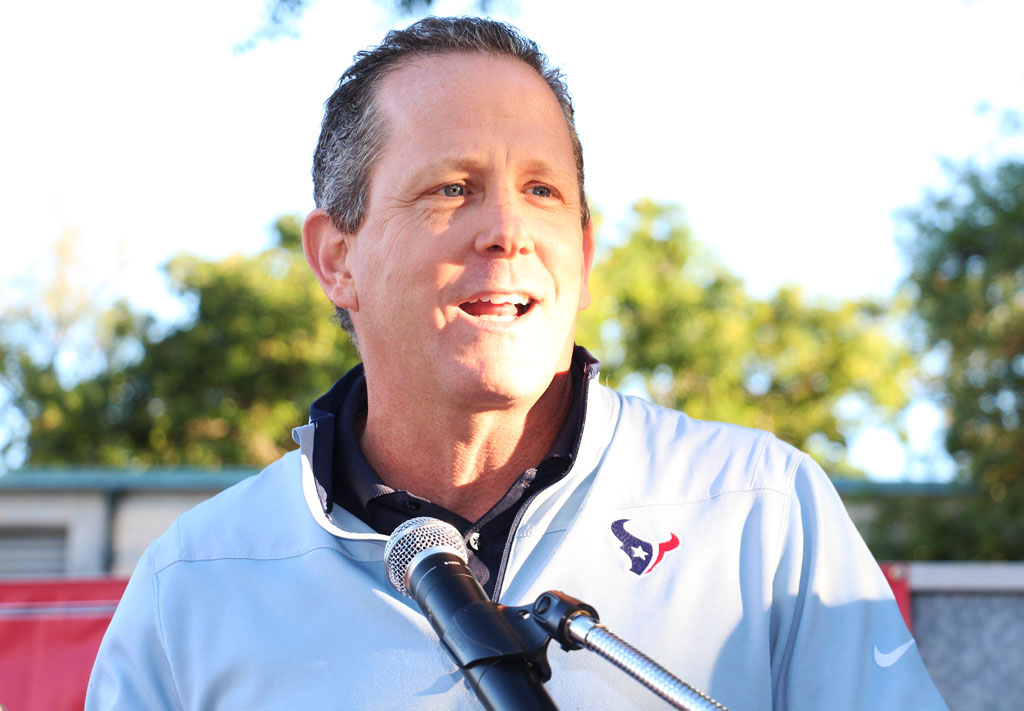Latest News
Bauer College Adds Jamey Rootes to Management & Leadership Faculty
Rootes to Teach Sports Leadership to Bauer Undergraduates
Published on March 26, 2021

Jamey Rootes, one of Houston’s leading executives for more than two decades, made headlines earlier this year when he retired as President of the Houston Texans. After overseeing the business and administrative side of an organization that became one of the most successful in professional sports, Rootes, the author of “The Winning Game Plan: A Proven Leadership Playbook for Continuous Business Success,” began teaching an undergraduate class in Sports Leadership for the Department of Management & Leadership at the C. T. Bauer College of Business in January.
Here, Rootes talks about his experience thus far at the Bauer College and shares a few of the leadership principles that have provided a foundation for his successful career.
Can you provide a little background for deciding to teach a class and your subsequent retirement from The Texans?
“Leaving the Texans was very difficult for me. I started with the team when it was just an idea and we built it into one of the most valuable professional sports franchises in the world. However, after 20 years, it was time to take on some new challenges. There was no connection between my departure and teaching at the University of Houston, but it has been a welcome distraction for me and it has been an awesome experience. The genesis was simply a discussion with Bauer College Dean Paul Pavlou. I asked him how practitioners find their way into the classroom and we decided to make it happen. It has been an awesome new challenge for me.”
What are a few of the ways that sports leadership differs from standard leadership skills?
“I really don’t think there is a difference. Leadership is leadership. If I had to draw a distinction it would be that it is easier to create a compelling purpose that inspires people to give what I term ‘elective’ effort. Elective effort is at the heart of the ‘whatever it takes’ attitude. That’s when people do things because they want to and it really matters to them. However, every enterprise needs a compelling purpose to maximize performance.”
What principles of success do you stress in teaching your undergraduate students?
“I believe one of the most important and most difficult aspects of leadership is dealing with the many people issues you face. Attracting, retaining and inspiring top talent is crucial. The measure of a leader is the success of the team. As legendary Florida State coach Bobby Bowden said, ‘The guy with the best players usually wins.’ If you can’t handle the people issues well, then leadership is probably not for you.”
Has the teaching experience been eye-opening for you in any ways?
“I had no idea how difficult this would be. I was so nervous! After my first class, I told my wife, ‘I would feel more comfortable giving a speech to 1,000 CEOs or have an interview beamed across the globe than lecture to these students.’ It’s getting easier, but it is still a rush for me. Acquiring any new skill comes with some nerves on the front end, but that’s how you know you are learning and growing.”
You stress the opportunity for growth when dealing with challenges in your book, saying that they are “the impetus for change, learning, and growth.” Your students may face more challenges than recent generations, as they enter their professional lives. Do you think that bodes well for their success and/or for business innovation to occur?
“I do. Crisis is the combination of danger and opportunity. The danger screams loudly, and the trick is keeping your eyes open to the opportunities that are simultaneously being created. For example, last year as the Texans courageously battled through the challenges of COVID, we kept our eyes open for opportunity and wound up launching the Texans Fit fitness center brand, which will soon have six locations in the Houston area. This would not have happened without the “crisis” of the pandemic.”
Would you like to provide any teasers about the type(s) of businesses you might be engaged in going forward?
“Since leaving the Texans I have gotten tons of great advice from friends. There is consensus that it is important to take at least six months before deciding what to do next. I am listening to opportunities, but I do not expect to have any answers for some time. For now, I am working to promote my book, create a public speaking platform and, of course, teaching an amazing group of students at UH.”


